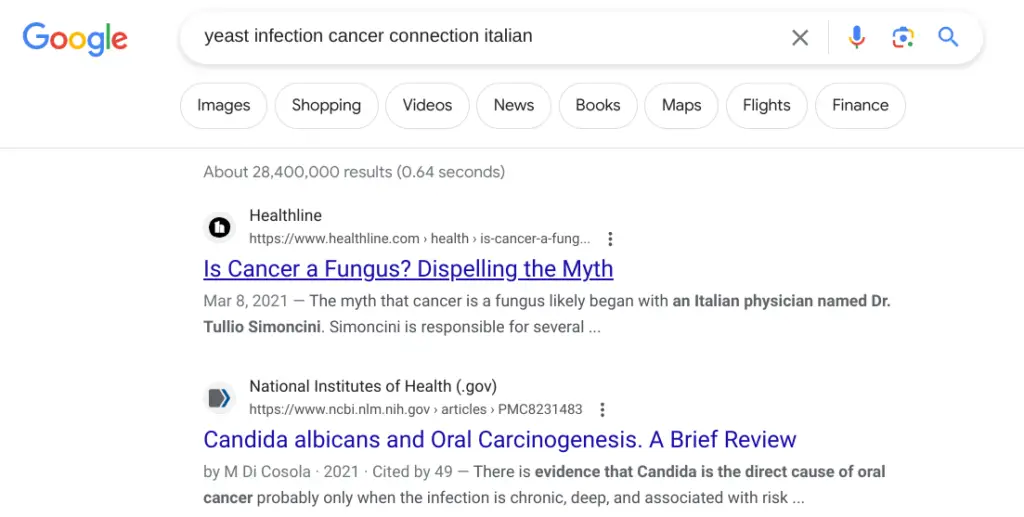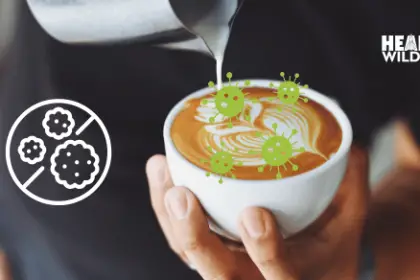Years ago in my health research I discovered a doctor by the name of Dr. Tullio Simoncini. He wrote a book called ‘Cancer is a Fungus’ that took a lot of heat from the medical community. The whole ‘correlation doesn’t imply causation’ phrase was thrown a lot, but Dr. Tullio stuck to his guns.
When considering writing this article I googled this and look at the first two results:

Now, you’ll notice the first website, healthline tries to ‘dispell the myth’ yet the #1 result is from the National Institute of Health, a Government website that shares scientific research and studies. Healthline is a health large health publication, similar to our site, GreenLivingTribe.com, just much larger and influential. What I found funny about these search results is that they’re trying to ‘dispell a myth’ yet the #2 result quite literally proves causation between fungus and cancer in actual science, not based on the biased content of a news publication that may be funded by a harmaceutical company.
This one google search made me think, this topic is worth exploring deeper and diving into the science and reasoning behind why an Italian doctor felt it was so important to notify the public that cancer is a fungus that he wrote an entire book on it to get the word out. Yeast infections are candida, which is a fungal infection in the body.
Does Cancer Start as a Fungus?
Cancer continues to be a worldwide health concern, affecting millions of lives every year. While the causes of cancer are multifactorial and complex, some researchers have explored potential connections between cancer and other health conditions. One such intriguing hypothesis is the association between yeast infections and cancer. Tullio Simoncini, an Italian oncologist, has put forth a controversial theory suggesting that cancer is a fungal infection. In this article, we will examine Simoncini’s work and explore relevant studies on PubMed.gov that investigate the potential link between yeast infections and cancer.
Tullio Simoncini’s Theory: Tullio Simoncini proposes that cancer is caused by an underlying fungal infection, specifically the Candida species. He argues that fungi are opportunistic pathogens that invade the body and form colonies, leading to the development of tumors. Simoncini’s treatment approach involves the use of sodium bicarbonate (baking soda) to eliminate the fungal infection and, theoretically, cure cancer. For the record, it probably isn’t this simple, however, maybe he’s onto something small and simple, yet important.
Supporting Studies on PubMed.gov: PubMed.gov, a widely recognized database of scientific literature, hosts numerous studies exploring the potential association between yeast infections and cancer. While these studies offer insights, it is important to note that this could simply be one of the factors in cancer formation but not everything. Just like there are multiple reasons your body would burn fat, or build muscle. If you eat more food but don’t work out, it doesn’t mean your body will build muscle. You need the caloric increase and physical activity combined for the end result. Cancer may very well be the same.
Candida Research Correlating With Cancer
One study published in the journal PLoS ONE in 2013 analyzed the presence of Candida albicans in different types of cancer tissue. The researchers found higher levels of Candida colonization in tumor samples compared to adjacent normal tissue, suggesting a potential association between Candida and cancer development.
Another study published in the journal PLoS Pathogens in 2015 investigated the role of Candida infections in the development of oral squamous cell carcinoma (OSCC), a type of oral cancer. The researchers discovered that Candida infection enhanced the progression of OSCC in a mouse model, indicating a possible contribution of fungal infections to cancer development.
However, it is important to highlight that these studies provide preliminary evidence and further research is needed to establish a causal relationship between yeast infections and cancer in humans.
Furthermore, it is crucial to acknowledge that cancer is a complex disease with diverse causes, including genetic, environmental, and lifestyle factors. Fungal infections, including yeast infections, may act as opportunistic infections in individuals with weakened immune systems but are unlikely to be the sole cause of cancer in most cases.
While Tullio Simoncini’s theory proposing a link between yeast infections and cancer is intriguing, the scientific evidence supporting this connection remains limited. Studies on PubMed.gov have explored potential associations between Candida colonization and cancer development, but they do not establish a direct causative relationship. It is essential to approach such claims with caution and rely on well-established scientific evidence when discussing the causes and prevention of cancer. Further research is necessary to unravel the complexities of cancer and understand the various factors that contribute to its development.
What Causes Cancer Beyond Fungus?
Beyond fungus, there are many other factors that can play a role in the dysregulation of healthy cells. Another important factor that has strong correlation is imbalanced blood glucose levels and insulin levels in the body. Cancer cell receptors seek out sugar to feed and fuel their growth more than ANYTHING. In other words, sugar feeds cancer cells. Guess what else feeds Candida and yeast infections? Sugar!
The question then becomes how can we keep yeast infections or any Candida infection at bay in the human body to prevent the overgrowth of yeast infections, or any other fungal infection, even the initial growth of cancer cells or tumors?
There are specific botanicals that act as strong anti-fungal agents in the body. If you begin to get these in your body the ecosystem of your biology will be in a state to prevent these things to grow out of control in a problematic way in the first place.
Keep Harmful Yeast Infection Fungus At Bay:
When it comes to combating fungal infections, nature has provided us with a wealth of potent remedies. Oregano, Una de Gato (Cat’s Claw), Sangre de Grado (Dragon’s Blood), Neem, Clove, and Cedar are all natural substances known for their remarkable anti-fungal properties. In this article, we will explore the effectiveness of these botanicals in fighting fungi, particularly Candida, and highlight their potential as natural alternatives to conventional antifungal treatments.
Oregano: Oregano, rich in the compound carvacrol, possesses powerful anti-fungal properties. Carvacrol has been shown to inhibit the growth of Candida and other fungi by disrupting their cell membranes, leading to their demise. Incorporating oregano into your diet or using oregano oil as a topical treatment may help combat Candida overgrowth and reduce the severity of fungal infections.
Una de Gato (Cat’s Claw): Una de Gato, derived from the bark of a South American vine, has been traditionally used for its anti-fungal and immune-enhancing properties. Studies have shown that compounds present in Una de Gato, such as quinovic acid glycosides, have inhibitory effects against various fungal strains, including Candida. This botanical may assist in controlling fungal infections by bolstering the immune system and combating the underlying causes of Candida overgrowth.
Sangre de Grado (Dragon’s Blood): Sangre de Grado, a resin obtained from the Croton lechleri tree, has been used for centuries in traditional medicine for its antifungal, anti-inflammatory, and wound-healing properties. Research suggests that Sangre de Grado inhibits the growth of Candida by disrupting fungal biofilms and damaging fungal cells. It may be used both internally and topically to combat Candida-related infections and promote healing.
Neem: Neem, a tree native to India, has long been valued for its medicinal properties, including potent anti-fungal effects. Neem contains compounds like gedunin and nimbidin, which have been found to inhibit the growth of Candida and other fungi. Neem extracts, oils, or powders can be used internally or topically to address fungal infections and soothe related symptoms.
Clove: Clove, with its active compound eugenol, possesses notable anti-fungal properties. Eugenol has been shown to inhibit the growth of Candida and other fungi by disrupting their cell membranes. Clove essential oil or powdered clove can be applied topically to affected areas or used as a mouthwash to combat oral thrush caused by Candida overgrowth.
Cedar: Cedarwood oil, derived from various species of cedar trees, exhibits anti-fungal properties that can help combat fungal infections. Research suggests that cedarwood oil may inhibit the growth of Candida and other fungi by disrupting their cellular structures. It can be applied topically, diluted with a carrier oil, to address fungal skin conditions or used in diffusers for its antimicrobial effects.
Radiate 21 is Your Anti-Candida Yeast Infection Solution
Radiate 21 stands out as the ultimate anti-fungal and anti-candida supplement due to its unique blend of powerful ingredients. It combines the potent anti-fungal properties of Una de Gato, Sangre de Grado, Neem, Oregano, Garlic, Clove, Lemongrass, and Coconut. Una de Gato, Sangre de Grado, and Neem have long been recognized for their ability to combat fungal infections, including Candida, by inhibiting the growth of fungi and supporting immune function. Oregano, Garlic, Clove, and Lemongrass, known for their antimicrobial properties, further contribute to the supplement’s effectiveness in fighting off fungal overgrowth.
Additionally, Radiate 21 incorporates citrus fruits such as Lime, Lemon, and Orange, which provide essential vitamins and bioactive compounds. These citrus fruits are known to have antifungal properties and can help strengthen the immune system, aiding in the body’s defense against Candida and other fungal infections. The inclusion of Camu Camu, a fruit rich in vitamin C, and Ashwagandha, an adaptogenic herb, enhances the overall health benefits of the supplement, supporting immune function and reducing the impact of stress on the body. With this comprehensive blend of ingredients, Radiate 21 offers a holistic approach to combating fungal infections, making it an excellent choice for individuals seeking an effective anti-fungal and anti-candida supplement.






